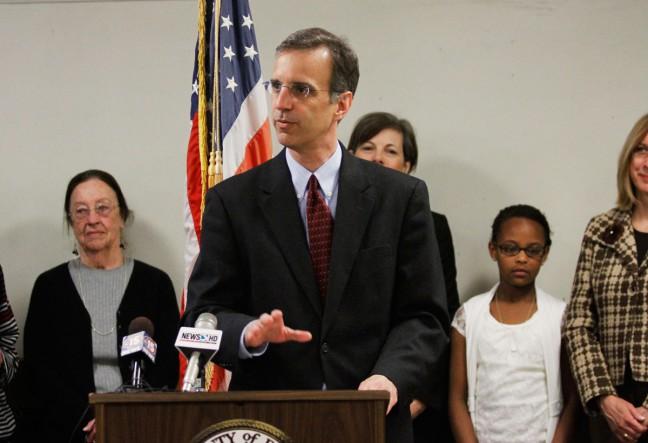In response to the 2013 citywide Race to Equity report that sought to take on Madison’s racial disparity issues, officials have outlined concrete steps to remediate overcrowding, mental health care and racial disparity in a recent proposal.
County Executive Joe Parisi proposed a plan last week that includes measures to make driver’s licenses more accessible and to reduce fines for minor drug possessions.
In Madison, racial disparity is a widespread issue across many sectors. The citywide unemployment rate among African Americans is 25.2 percent compared to 4.8 percent for whites. The percentage of Caucasians that live in poverty is 8.7, compared to 54 percent for African Americans – the national average for African Americans is 28 percent.
Erica Nelson, project director for Madison’s Race To Equity, said county and city officials have responded well since the report’s release, and Parisi’s proposal follows that pattern.
The plan primarily aims to help less affluent Dane County residents more easily acquire and keep a driver’s license. Parisi said not having a driver’s license contributes to poverty. Many jobs require a driver’s license, such as those in construction, Parisi said.
Parisi said while driver’s education used to be taught in schools, that practice has become less common. Today, driver’s ed costs more than $400 and often requires ownership of a car, which can be restrictive for low-income families.
Parisi’s plan looks to start a pilot program with the Madison School District to provide driver’s ed to students. He will also be calling on the state to reinstate driver’s ed in all schools.
Impoverished residents in Madison who do obtain a license often have it revoked due to unpaid traffic fines or minor drug possessions, Parisi said. The plan will provide $20,000 to eliminate wait lists for driver’s license recovery programs.
Parisi’s plan also aims to reduce the cost of minor drug possession charges within the county. Currently fines range from $500 to $1000 depending on where the citation is given.
Parisi said while this may be an easy price to pay for many wealthy families, the cost is unattainable for those who live in poverty. He said specifically for younger people from impoverished families that are unable to pay, the fine often results in a downward spiral into the criminal justice system.
“The punishment should equal the offense,” Parisi said. “It all comes down to a person’s income determining their path in life based on a mistake.”
While providing job opportunities to those who live in poverty is important, making sure people can get to their jobs is also a big part of the puzzle, Nelson said.
Nelson said the biggest factor in fighting racial disparity in Madison is employment and economic well-being.
“These are all steps in the right direction and I’m hopeful,” said Nelson.
The plan promotes transitional job programs. Parisi said these programs will help those in poverty find temporary work while they train for more skilled jobs.
Parisi said the greatest challenge in enacting the proposal will be keeping momentum throughout the process. He said a change in the statistics will determine success.
Parisi said he expects legislation surrounding some of the driver’s license programs to be introduced within a couple of weeks. Parisi said he hopes other counties will follow suit and that the issue will be addressed at all levels of state government.


